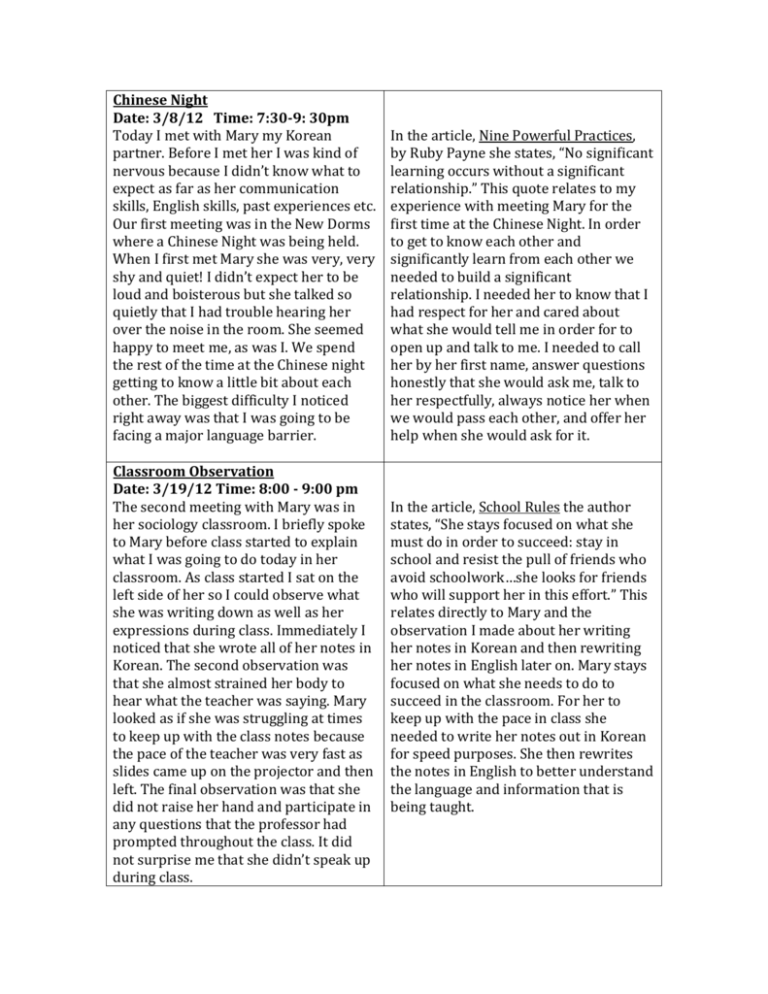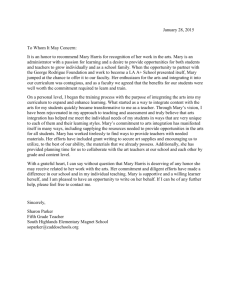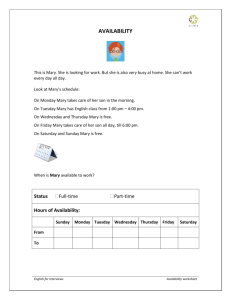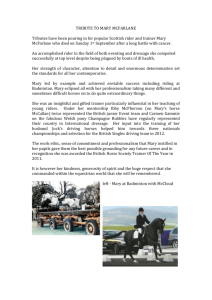ethnography journals
advertisement

Chinese Night Date: 3/8/12 Time: 7:30-9: 30pm Today I met with Mary my Korean partner. Before I met her I was kind of nervous because I didn’t know what to expect as far as her communication skills, English skills, past experiences etc. Our first meeting was in the New Dorms where a Chinese Night was being held. When I first met Mary she was very, very shy and quiet! I didn’t expect her to be loud and boisterous but she talked so quietly that I had trouble hearing her over the noise in the room. She seemed happy to meet me, as was I. We spend the rest of the time at the Chinese night getting to know a little bit about each other. The biggest difficulty I noticed right away was that I was going to be facing a major language barrier. Classroom Observation Date: 3/19/12 Time: 8:00 - 9:00 pm The second meeting with Mary was in her sociology classroom. I briefly spoke to Mary before class started to explain what I was going to do today in her classroom. As class started I sat on the left side of her so I could observe what she was writing down as well as her expressions during class. Immediately I noticed that she wrote all of her notes in Korean. The second observation was that she almost strained her body to hear what the teacher was saying. Mary looked as if she was struggling at times to keep up with the class notes because the pace of the teacher was very fast as slides came up on the projector and then left. The final observation was that she did not raise her hand and participate in any questions that the professor had prompted throughout the class. It did not surprise me that she didn’t speak up during class. In the article, Nine Powerful Practices, by Ruby Payne she states, “No significant learning occurs without a significant relationship.” This quote relates to my experience with meeting Mary for the first time at the Chinese Night. In order to get to know each other and significantly learn from each other we needed to build a significant relationship. I needed her to know that I had respect for her and cared about what she would tell me in order for to open up and talk to me. I needed to call her by her first name, answer questions honestly that she would ask me, talk to her respectfully, always notice her when we would pass each other, and offer her help when she would ask for it. In the article, School Rules the author states, “She stays focused on what she must do in order to succeed: stay in school and resist the pull of friends who avoid schoolwork…she looks for friends who will support her in this effort.” This relates directly to Mary and the observation I made about her writing her notes in Korean and then rewriting her notes in English later on. Mary stays focused on what she needs to do to succeed in the classroom. For her to keep up with the pace in class she needed to write her notes out in Korean for speed purposes. She then rewrites the notes in English to better understand the language and information that is being taught. After class I spoke with Mary about my observations. She told me that she writes all notes from class in Korean so that she can write faster. Mary told me that later after class she attempts to rewrite all of her notes in English for practice. I asked her why she looked kind of strained during class. She was surprised that I had noticed this detail. She explained that it is difficult to understand 100% of the English that the professor was speaking during her lecture so she strains her body unintentionally trying to understand what she is saying. The last question I asked her about was the speed of the notes coming up on the projector. Mary said it is very difficult to read all of the notes, understand them, and then write them down in Korean because the next slide come up. I asked Mary why she didn’t speak up when the teacher asked about certain topics. She explained that her English speaking is very poor so she feels embarrassed that other student would make fun of her or that she would stick out. World Expo 2012 Date: 3/23/12 Time: 12:00-2:00 pm My third time meting with Mary was at the World Expo 2012. I spent about ten minutes searching for her because there were a lot of people walking around. Eventually I found Mary at her table where she was presenting about her country with two other females. We talked about where she was from which is Daejeon, South Korea. Mary also taught me all about the Korean culture and more specific information about her hometown of Daejon. Mary also taught me about the food that they eat. This was a great experience for me to get to know all about her culture, hometown aspects, and food traditions. In the article, Gender Matters in Elementary Education by Virginia Bonomo she states, “Girls can multitask better than boys because the female corpus callosum is the nervous tissue that sends signals between the two halves of the brain.” This explains exactly what I was going through at the World Expo. When Mary was teaching me all about her culture, hometown, and food traditions. I noticed she could talk explain different things to me about her project without being distracted by hundreds of other people walking up to her table and talking around her. Even though I was very interested in what she was telling me I became increasingly distracted by the mass of people walking and talking around us. It was very noticeable that she didn’t have an issue with this and that may be because she can multitask considerably better than me. Meet with friends Date: 3/27/12 Time: 1:00-3:00 pm The fourth experience I had with Mary was in the Smaug where I met Mary’s friends. As I met the three friends Mary had brought with her I noticed right away that they all were extremely shy and withheld. I had to initiate all conversation at the beginning because they didn’t really have much to say to me. Because of this I told them all about myself and what American culture is like. I also informed them that I am a student –athlete at Winona State. I explained what the sport of football is and what life in college is like playing a sport and going to school. They seemed very interested and laughed a lot at what I was telling them. Towards the end I told them that I would sit back and In the article, How Girls Negotiate School by The Jossey-Bass Reader on Gender in education, “Girls have accounts of pressures to be “nice” and “quiet”, to get along with everyone to avoid conflict or even notice.” This quote relates to my observation of Mary and her three friends when I met them. They all were very, very quiet and shy. When we I asked Mary or her friends certain questions they simply smiled at me and not really answer initially. This is partially because I was still getting to know Mary and meeting her friends for the first time. It was also because females have the pressure to be “quiet” and “nice” so they aren’t seen as being rude which had may have been the case observe them interacting with each in her culture. other. I noticed that they constantly were laughing and giggling with each other, which is fairly normal for friends to do. They all went and got lunch and brought that back. I observed that they all chose the Asian option of food. None of them used chopsticks but they told me they usually do if they have the option to use them. They ate fairly quickly and didn’t converse much while eating. Interview Date: 3/30/12 Time: 10:00-11:00 am The fifth meeting I had with Mary was to do an interview with her and to get lunch. We met at Winona Sandwich Company on Huff Street. Mary brought two new friends this time. As we were eating I asked her more about what some of the biggest differences the US had with South Korea. She told me that she noticed everyone in the US wore sweat pants and sweat shirts compared to South Korea where everyone dressed up in nice attire. She told me that Americans really appreciate their privacy and possessions and that it is more important than what Koreans value. Next, I asked her what the biggest challenges were when coming to the US. She replied with the language barrier is extremely difficult to communicate with others. She said it was difficult to make friendships with Americans because we are all stuck in our ways and don’t branch out as much. She also said that academics is much harder here in America than what it is like in South Korea. I asked Mary what her reasoning was for choosing Winona State University over all of the other schools in the United In the article, Nine Powerful Practices, by Ruby Payne she states, “When an individual is learning something new, learning should happen in a supportive context.” This relates to my discussion with Mary and her friends when I was teaching them about American cultures. When I explained why Americans would wear casual attire they assumed that all Americans wore casual clothes all the time. In order for them to understand that Americans don’t always dress in casual clothes, I needed to explain this concept in a supportive context. I went on to explain that this is because they are only exposed to college students who prefer to dress in comfortable clothing while at college. I continued to explain that in the professional world outside of college, Americans dress in professional attire. Also when Americans go to a formal occasion they would dress up in formal clothes. States. She told me that there were 20 different options of schools to choose from. Her main reason for picking Winona State was that they were told that Winona State did not have a very big Korean population. They valued this because with fewer Koreans the more opportunity they would have to speak and learn English. She was very surprised that Winona had such a large population of Koreans with about 400 students. I asked Mary what her and her friends do for fun when not in school. She replied that they mostly sit around and talk with each other, do homework together, eat food, walk/ride bikes around the lakes, and sometimes going out for a drink at the bar. She explained Americans drink very hard when out at the bars. Mary and her friends only have a couple of beers. References: Bonomo, V. (2006). “Gender matters in elementary education. Educational Horizons”,257-265. Ginorio, A. (N.D.). “Characteristics Of Communities Affecting Participation/ Success”. The Jossey-Bass reader on gender in education, 525-543 Payne, R. (2008). Nine Powerful Practices. Educational Leadership, 48-52 Research for Action (N.D.). How girls negotiate school. The Jossey-Bass reader on gender in education, 243-273








